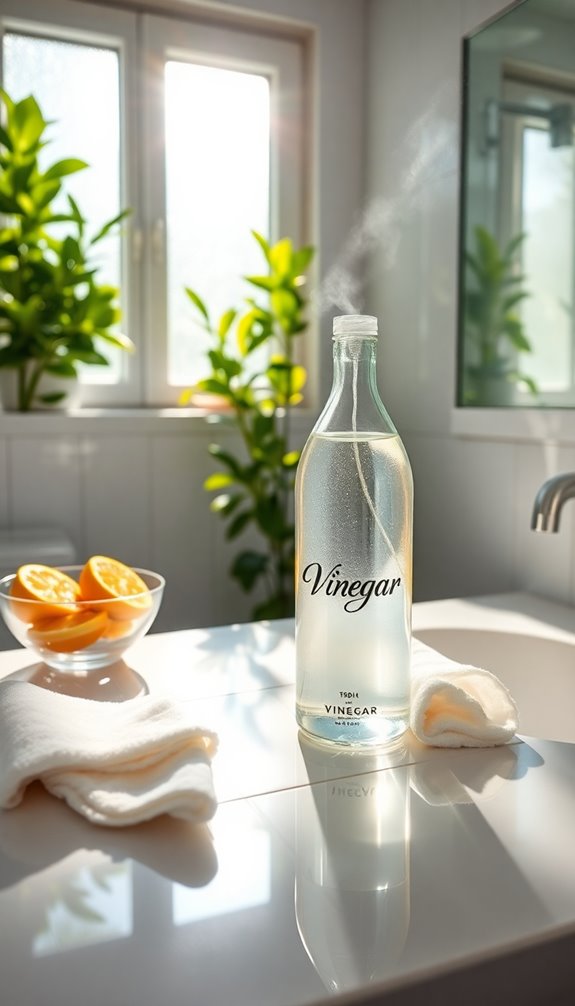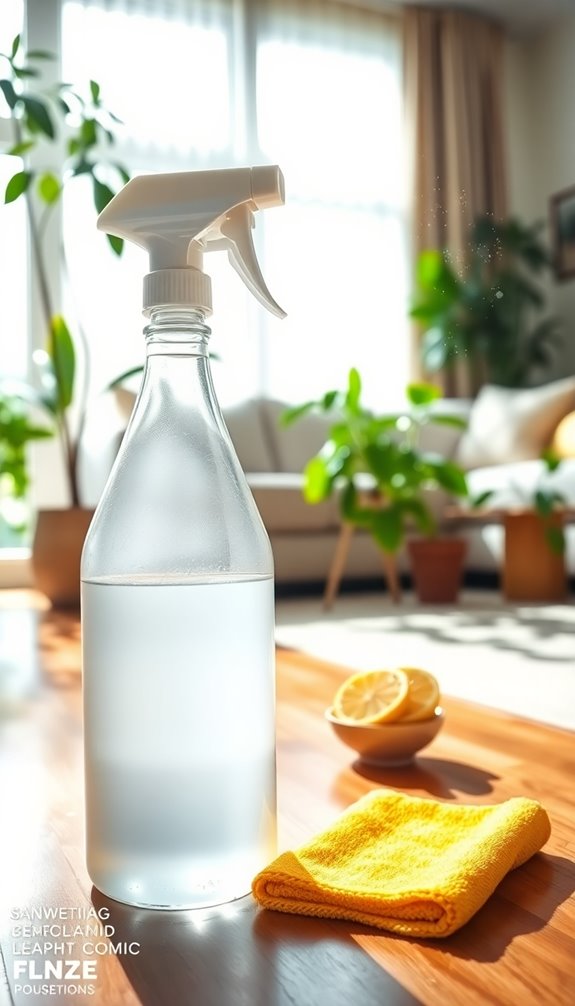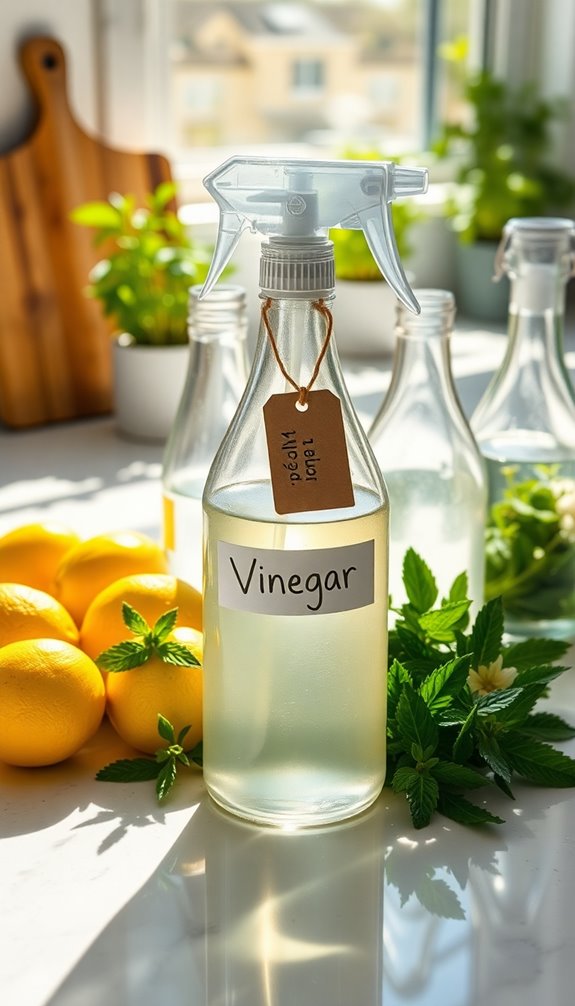You can effortlessly clean your home using white vinegar, a powerful and eco-friendly cleaning solution. Mix equal parts vinegar and water in a spray bottle for an all-purpose cleaner, perfect for countertops and surfaces. For the bathroom, use vinegar to tackle toilet stains and freshen up your shower. Refresh your bedding and even eliminate odors in your laundry by adding vinegar during wash cycles. Remember to avoid using it on granite or electronic screens. This versatile cleaner can transform your cleaning routine. Stick around for even more tips and tricks to maximize its effectiveness!
Benefits of Using White Vinegar
When it comes to cleaning your home, white vinegar is a powerhouse that offers numerous benefits. This environmentally friendly cleaning solution is a versatile natural cleaner that can tackle a wide range of household tasks. You can use white vinegar to remove stains, clean glass, and deodorize various spaces, making it a must-have in your cleaning arsenal.
One of the standout features of white vinegar is its acetic acid content, which gives it remarkable antimicrobial properties. This means it effectively reduces bacteria and odors, especially in high-traffic areas like kitchens and bathrooms. Regular use of DIY non-toxic cleaners ensures a hygienic space without safety compromises. Additionally, distilled white vinegar serves as a natural disinfectant that safely sanitizes surfaces.
Plus, it's an inexpensive alternative to harsh chemical cleaners, often costing less while delivering similar or even superior results.
When you do laundry, white vinegar can work wonders. It boosts detergent performance, softens fabrics, and neutralizes odors, providing you with a multi-functional cleaning aid. Additionally, it acts as a natural fabric softener that leaves clothes feeling soft and fresh.
Cleaning Kitchen Surfaces
Here are a few ways to utilize it:
- Mix equal parts vinegar and water in a spray bottle for a simple cleaning solution.
- Spray straight vinegar on cutting boards, let it sit for a few minutes, and rinse to eliminate bacteria. This method is particularly effective for cross contamination prevention in the kitchen.
- Use vinegar and water to deodorize your refrigerator, ensuring food storage areas remain fresh.
When wiping down your countertops, the vinegar solution works wonders, but be cautious—avoid granite or marble surfaces, as the acidity can cause damage. Additionally, it's important to note that using a stronger disinfectant like Clorox Clean-Up Cleaner + Bleach can provide enhanced protection against pathogens.
For a sparkling clean microwave, boil a bowl containing half vinegar and half water for several minutes; the steam will loosen grime, making it easy to wipe away.
Incorporating white vinegar into your cleaning routine not only helps maintain a hygienic kitchen but also keeps it smelling fresh. Additionally, vinegar acts as a natural antimicrobial agent, making it particularly effective for kitchen surfaces that require disinfection.
Embrace this eco-friendly solution and enjoy the benefits of a spotless space.
Refreshing the Bathroom

When it comes to rejuvenating your bathroom, white vinegar is your best friend. You can tackle toilet stains, soap scum, and general disinfection with just a few simple steps. Additionally, a vinegar soak can be particularly effective for removing mineral deposits from faucets and ensuring a sparkling finish on your fixtures. To enhance your cleaning routine, consider using a vinegar-water mix for scrubbing surfaces to effectively eliminate grime. Regular disinfection of your bathroom is essential for preventing infections and maintaining a healthy environment. Let's explore how to use vinegar effectively for cleaning your toilet, shower, and overall bathroom surfaces.
Toilet Cleaning Tips
Revitalizing your bathroom starts with a clean toilet, and white vinegar is your go-to solution. This powerful, non-toxic alternative to traditional cleaning products effectively disinfects and deodorizes your toilet bowl while eliminating hard water stains.
Here are some quick tips to get you started:
- Pour 1 cup of white vinegar into the toilet bowl and let it sit overnight for maximum effectiveness.
- For tougher stains, mix vinegar with baking soda, scrub the toilet bowl, and flush for a sparkling clean finish.
- Enhance the cleaning power by adding a few drops of essential oils to the vinegar for a fresh, inviting scent.
Regularly using vinegar not only keeps your toilet clean but also helps prevent the buildup of mineral deposits.
You'll appreciate how easy it's to maintain a fresh bathroom environment with this simple solution. Plus, since it's safe for households with children and pets, you can feel good about using it.
Shower and Tub Care
Keeping your shower and tub in top shape is essential for a clean and inviting bathroom. To tackle soap scum and hard water stains, boil a mixture of equal parts vinegar and water. Use this cleaner to wipe down surfaces, leaving them fresh and shiny.
For stubborn soap scum, create a paste with vinegar and baking soda, apply it to the affected areas, and let it sit for 10-15 minutes. Scrub it clean, and rinse thoroughly.
To maintain ideal water flow, soak your showerhead in a bag of vinegar overnight, dissolving any mineral deposits. To prevent mold and mildew, spray straight vinegar on your shower surfaces after each use, then rinse. This simple step keeps your bathroom fresh and clean.
For a deeper clean, pour 1/2 cup of vinegar into the tub and let it sit for 30 minutes before scrubbing. This process helps disinfect and deodorize the area, ensuring a sanitary space for your relaxation.
General Bathroom Disinfection
A clean bathroom is essential for a healthy home, and using white vinegar is one of the easiest ways to achieve thorough disinfection. This natural solution not only helps eliminate bacteria but also leaves your surfaces sparkling clean.
Here's how to refresh your bathroom effectively:
- Combine equal parts white vinegar and water to scrub sinks, countertops, and bathtub areas.
- Pour a cup of vinegar into the toilet bowl, letting it sit overnight before scrubbing with a toilet brush.
- For shower doors and tiles, spray full-strength vinegar, let it sit for 15 minutes, then scrub away soap scum and hard water stains.
Additionally, maintain fresh drains by pouring 1/2 cup of vinegar followed by hot water weekly.
For bathroom fixtures like faucets and handles, spray vinegar directly on them and wipe with a cloth for a streak-free shine.
With these simple steps, you'll disinfect your bathroom and eliminate unpleasant odors, all while using a safe and eco-friendly solution.
Make white vinegar your go-to cleaning agent and enjoy a cleaner, healthier bathroom!
Maintaining the Bedroom
Maintaining a fresh and clean bedroom is essential for a good night's sleep. Start by tackling your mattress. To combat dust mites and odors, mix white vinegar, rubbing alcohol, and a few drops of tea tree oil in a spray bottle. Lightly spritz the mixture on your mattress and let it air dry. This will refresh your sleeping surface and help eliminate unwanted smells.
Next, give your bedding a boost. Combine equal parts vinegar and water in a vinegar solution and lightly spray it on your linens. This will neutralize musty odors and keep your bedding smelling fresh.
For curtains, wash them with vinegar to remove dust and improve air quality in your bedroom. Using natural solutions for cleaning not only helps to reduce chemical exposure but also promotes a healthier indoor environment.
Don't forget about fabric upholstery! Lightly spray a vinegar solution on your furniture to eliminate odors and refresh the material without using harsh chemicals.
Tidying the Living Areas

After creating a calming atmosphere in your bedroom, it's time to focus on tidying your living areas. You'll be amazed at how effective white vinegar can be for cleaning and freshening up your space. Here are some quick tips to get you started:
- Use a vinegar-water solution to clean glass surfaces for a streak-free shine.
- Polish wooden furniture with a mix of vinegar and olive oil.
- Lightly spray upholstery to eliminate odors.
Start by wiping down surfaces in your living areas with a vinegar solution. This not only helps disinfect high-touch areas but also leaves a natural shine.
For your windows and mirrors, a 50-50 vinegar-water solution applied with a microfiber cloth or newspaper will work wonders.
To keep your wooden furniture looking great, mix 1/4 cup of vinegar with 1 cup of olive oil. This combo cleans and conditions the wood, giving it a beautiful finish.
If you have area rugs, combine dish soap and vinegar to tackle stains, letting the mixture sit before blotting it away.
With these simple methods, you'll maintain clean and fresh living areas without harsh chemicals!
Laundry Hacks With Vinegar
If you're tired of stubborn odors lingering in your laundry, adding white vinegar can work wonders.
Not only does it eliminate unwanted smells, but it also acts as a fantastic fabric softener, leaving your clothes feeling soft and static-free.
Let's explore how you can easily incorporate vinegar into your laundry routine for fresher, cleaner results.
Odor Elimination Techniques
When it comes to tackling stubborn odors in your laundry, white vinegar is your secret weapon. This versatile ingredient not only helps with odor elimination but also leaves your clothes feeling fresh.
Here are some ways you can use white vinegar for a fresher laundry experience:
- Add 1/2 to 1 cup of white vinegar during the wash cycle to neutralize odors effectively.
- Soak musty clothes in a vinegar and water solution for 30 minutes before washing to remove lingering smells.
- For deodorizing shoes, spritz them with a vinegar solution to absorb unwanted odors.
Using vinegar can also combat mildew odors in your laundry. Simply add it to the wash cycle to help eliminate those musty smells.
Plus, vinegar acts as a natural fabric softener when added during the rinse cycle, leaving your clothes soft without harsh chemicals.
With its powerful odor-fighting properties, white vinegar is the solution to remove even the toughest smells from your fabrics. Incorporate these techniques into your laundry routine, and you'll enjoy fresher, cleaner clothes every time!
Fabric Softener Alternative
Looking for a natural way to soften your laundry? Try using white vinegar as a fabric softener alternative! Just add 1/2 to 1 cup of white vinegar during the rinse cycle, and you'll notice softer fabrics without the chemicals found in traditional fabric softeners.
Vinegar not only reduces static cling but also helps eliminate odors from sweat, mildew, and more, leaving your clothes smelling fresher.
Using vinegar can also brighten whites and prevent color bleeding, making it perfect for mixed laundry loads. It effectively removes detergent residues, ensuring your clothes are cleaner and minimizing irritation for sensitive skin.
To enhance your laundry experience, consider filling a jar with white vinegar and adding a few drops of essential oils. This simple addition creates a delightful scent while maintaining the natural properties of vinegar.
With white vinegar in your laundry routine, you'll enjoy a cleaner, softer, and fresher wardrobe without the harsh chemicals found in commercial fabric softeners.
Embrace this eco-friendly hack for a greener laundry day!
Homemade Cleaning Solutions

Creating homemade cleaning solutions with white vinegar is an effective and eco-friendly way to tackle household chores. You can easily whip up versatile cleaning solutions using simple ingredients you probably already have at home. Here are a few ideas to get you started:
- Mix equal parts of white vinegar and water for an all-purpose cleaner.
- Combine 1/4 cup vinegar, 1/3 cup rubbing alcohol, and water for a streak-free window cleaner.
- Create a rejuvenating air freshener by mixing vinegar with water and essential oils.
For a powerful all-purpose cleaner, try mixing 1 cup of vinegar, 2 teaspoons of borax, and 4 cups of hot water. This solution works wonders on various surfaces, making your cleaning tasks easier.
You can also enhance your homemade cleaning solutions by adding essential oils like lemon juice or tea tree oil, which boost antimicrobial properties and leave a pleasant scent.
With white vinegar cleaning, you'll enjoy a fresh, clean home without the harsh chemicals found in commercial products. Embrace these homemade cleaning solutions and breathe easy knowing you're keeping your space clean and green!
Safety Tips and Precautions
Using white vinegar for cleaning can be highly effective, but safety should always come first. One of the most important safety tips is to always dilute white vinegar with water before use. Undiluted vinegar can cause damage, especially to surfaces like granite or marble.
When cleaning electronic screens, steer clear of vinegar entirely, as it can harm the coatings and lead to damage. Before applying vinegar to new or sensitive materials, conduct a spot test in an inconspicuous area. This helps guarantee it won't cause discoloration or damage.
It's also essential to keep your vinegar solutions clearly labeled and stored out of reach of children and pets. Accidental ingestion or misuse can lead to serious issues.
When handling vinegar, particularly in concentrated forms, wear gloves to protect your skin from irritation or sensitivity.
Conclusion
With its powerful cleaning properties, white vinegar stands out as a natural alternative to harsh chemicals. While commercial cleaners promise shine and freshness, vinegar delivers the same results with a fraction of the cost and environmental impact. By embracing this simple ingredient, you not only protect your home but also contribute to a healthier planet. So, the next time you tackle a mess, remember that the solution might just be in your pantry, waiting to work its magic.